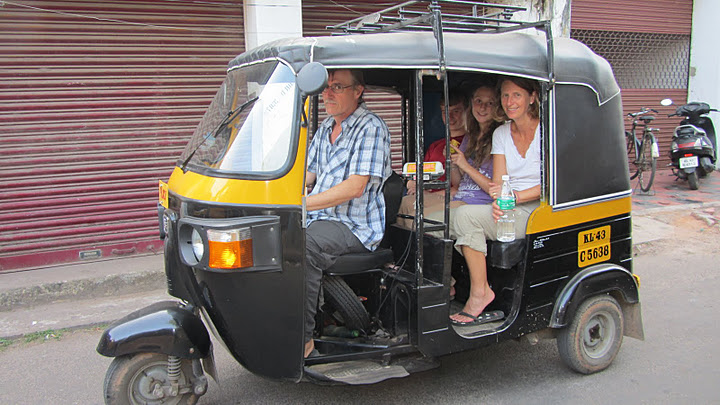The day before we left for this trip I went to get my haircut. I wanted to donate my ponytail. I’d done this several times before. It’s a really easy way to do good by somebody; the hair pretty much just grows itself. I had 10 1/2 inches to get rid of before heading to the heat of the tropics. Of course, while I was at the salon, all I could talk about was the impending trip. My hairdresser, Lisa Skinner, told anyone who walked into the shop that I was leaving to go travel around the world for a year. She was excited and impressed by our adventure. But the excitement was deflated when one man replied, “That sounds dangerous.” It was such a strange thing to hear. I didn’t know how to respond. I had thought about possible dangers and tried to prepare for them. Still it was never the first thing I thought of when planning the trip. But, it turns out, this guy was right. We did encounter danger. Every time someone got a hair cut.
Bill was the first to experiment with the barber. 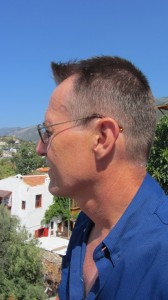 It was in Turkey. There the traditional arts of the barber are alive and well. The barber slapped hot towels on his face when he sat down in the chair. When they cooled, the barber laid another hot towel across Bill’s face. Next was the soapy lather brushed on in tight swirls across his beard. The barber ran the long straight blade through the foam. Then with scissors in hand, he cut Bill’s hair. Short. When I married Bill he had a ponytail. After the barber, Bill looked like he had just started bootcamp.
It was in Turkey. There the traditional arts of the barber are alive and well. The barber slapped hot towels on his face when he sat down in the chair. When they cooled, the barber laid another hot towel across Bill’s face. Next was the soapy lather brushed on in tight swirls across his beard. The barber ran the long straight blade through the foam. Then with scissors in hand, he cut Bill’s hair. Short. When I married Bill he had a ponytail. After the barber, Bill looked like he had just started bootcamp.
But the real excitement started after the haircut. 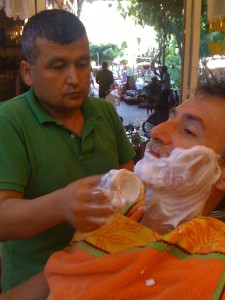 For the true polish of a Turkish haircut and shave the barber pulled out a long metal skewer with a large wad of cotton on the tip. With a match, this device became a torch. The barber ran the flames across Bill’s face, ears, and eyebrows singing any wayward hairs back to the level of their peers. The barber was a master. There were no nicks. There were no burns. Bill had escaped danger. At the end the barber and his young son massaged his shoulders and arms. Bill needed to relax after the harrowing experience.
For the true polish of a Turkish haircut and shave the barber pulled out a long metal skewer with a large wad of cotton on the tip. With a match, this device became a torch. The barber ran the flames across Bill’s face, ears, and eyebrows singing any wayward hairs back to the level of their peers. The barber was a master. There were no nicks. There were no burns. Bill had escaped danger. At the end the barber and his young son massaged his shoulders and arms. Bill needed to relax after the harrowing experience.
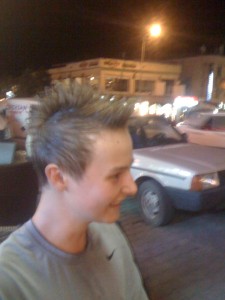 Hank also had a Turkish haircut. Hank had always had longish hair. It looked best after swimming in the ocean when he had true crunchy surfer’s hair. But usually it was just flat and either too long or too short. In Ürgüp, Cappadocia, we convinced him to change his hair. But it wasn’t just a hair cut. He got a style. Half a bottle of gel later his hair was slicked forward on the sides, and the top of his head stood straight up. This caused a lot of injury. To his ego.
Hank also had a Turkish haircut. Hank had always had longish hair. It looked best after swimming in the ocean when he had true crunchy surfer’s hair. But usually it was just flat and either too long or too short. In Ürgüp, Cappadocia, we convinced him to change his hair. But it wasn’t just a hair cut. He got a style. Half a bottle of gel later his hair was slicked forward on the sides, and the top of his head stood straight up. This caused a lot of injury. To his ego.
But things got better for Hank. His next haircut was in India. Unfortunately, I didn’t bring a camera, so I will try to build the scene with words. We went to find the barber whom the orphanage calls when all 25 boys need haircuts. We wandered through the village and found the barbershop on the side of the highway. The word barbershop brings up an image not quite true to what was there. It was more of a barbershack, 20 feet from the bustle of the road. The building couldn’t have been more than seven feet in each direction; three walls and a roof made of corrugated steel. The fourth wall was open so I could watch all that took place as Hank got his trim. There was a bench along one wall where the future customers waited, mirrors on the opposite wall, two barber chairs between, and one bare light bulb hanging from the ceiling illuminating the scene.
I approached the barber to ask how much for a haircut. “Five,” he replied. “Five what?” I asked, “Five rupees? Five hundred?” “Ten,” he responded. Okay, ten. My bargaining skills were sizzling that evening. The sun was going down with darkness blanketing the shack. The light from the single bulb made the scene glow from the inside. Hank waited on the bench inside while I watched the play of characters from outside. Both chairs had a barber trimming the hair of dark skinned Indian men. Four or five more men sat on the bench next to my overly fair boy while waiting for an empty barberchair. Hank was an anomaly in looks and sound as his American voice couldn’t blend with the Hindi bouncing around the shack. It was finally his turn for a hair cut, and he took a seat. Hand gestures were made to indicate what type of haircut he wanted and just how short it should be. There was little common language. This led to some doubt as to how successful this haircut would be. The scissors flew across his head. A young apprentice of maybe 10 years was sweeping the falling hair and grabbing tools as the barber needed them. The last step was the straight blade to shave the hair on Hank’s neck. The apprentice grabbed the blade, gave it to the barber, and the barber started shaving. That’s when the lights went out. It was dark. Hank didn’t move. He wanted to avoid an accidental slice across his neck. He was, he believed, in mortal danger. But five or ten minutes later the lights came back on, and the last of Hank’s overgrown hairs were shaved away. As he finished I payed the barber the 10 rupees. The haircut was perfect. It cost all of 20 cents.
In Vietnam, Bill and Hank had special treatment. 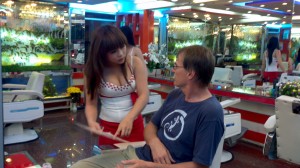 In Ho Chi Minh City the hair salons employ men to cut the hair. But women do a lot of work there. They provide the nail care, the massages, and the enticement. Dressed in matching, sequined, and colorful dresses five or six women invite customers into the salon. Bill sat down in the barber chair and was given a “menu” of choices for hair care by a young, buxom Vietnamese woman. We convince Hank to join him for a haircut while Cat and I spent the hour on a couch giggling and “conversing” with these women. Despite all the cleavage parading in front of my husband and son this haircut was relatively risk free.
In Ho Chi Minh City the hair salons employ men to cut the hair. But women do a lot of work there. They provide the nail care, the massages, and the enticement. Dressed in matching, sequined, and colorful dresses five or six women invite customers into the salon. Bill sat down in the barber chair and was given a “menu” of choices for hair care by a young, buxom Vietnamese woman. We convince Hank to join him for a haircut while Cat and I spent the hour on a couch giggling and “conversing” with these women. Despite all the cleavage parading in front of my husband and son this haircut was relatively risk free.
Cat also got her haircut in Ho Chi Minh City, her only one of the year. We were exploring alleys of the city the day after the boys had their haircuts. 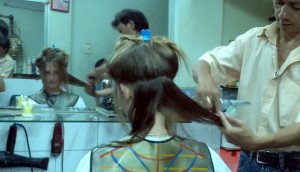 As the alleys are only wide enough for pedestrians, the city calms down in them. No motorcycles weaving around us or small trucks honking their path clear, we were able to walk slowly and look into the shops. We came across a hair salon with a young woman seated inside. We pantomimed a haircut. We thought she agreed, but she abandoned us, quickly running out of the shop. But in time she brought a young man back with her. The stylist. Cat sat down in the chair, he wrapped the cape around her shoulders, pinned the top layer of hair on top of her head, and started cutting. With a straight blade. I audibly gasped. He was shaving her hair not cutting it. Here was trouble. Cat is going to kill me, I thought. This just isn’t going to work. But slowly the layers were created, and the random long hairs were trimmed, the edges evened up. When her hair dried in the hot, humid air of Vietnam she had curls and a bounce she’d never had before. She had a beautiful haircut.
As the alleys are only wide enough for pedestrians, the city calms down in them. No motorcycles weaving around us or small trucks honking their path clear, we were able to walk slowly and look into the shops. We came across a hair salon with a young woman seated inside. We pantomimed a haircut. We thought she agreed, but she abandoned us, quickly running out of the shop. But in time she brought a young man back with her. The stylist. Cat sat down in the chair, he wrapped the cape around her shoulders, pinned the top layer of hair on top of her head, and started cutting. With a straight blade. I audibly gasped. He was shaving her hair not cutting it. Here was trouble. Cat is going to kill me, I thought. This just isn’t going to work. But slowly the layers were created, and the random long hairs were trimmed, the edges evened up. When her hair dried in the hot, humid air of Vietnam she had curls and a bounce she’d never had before. She had a beautiful haircut.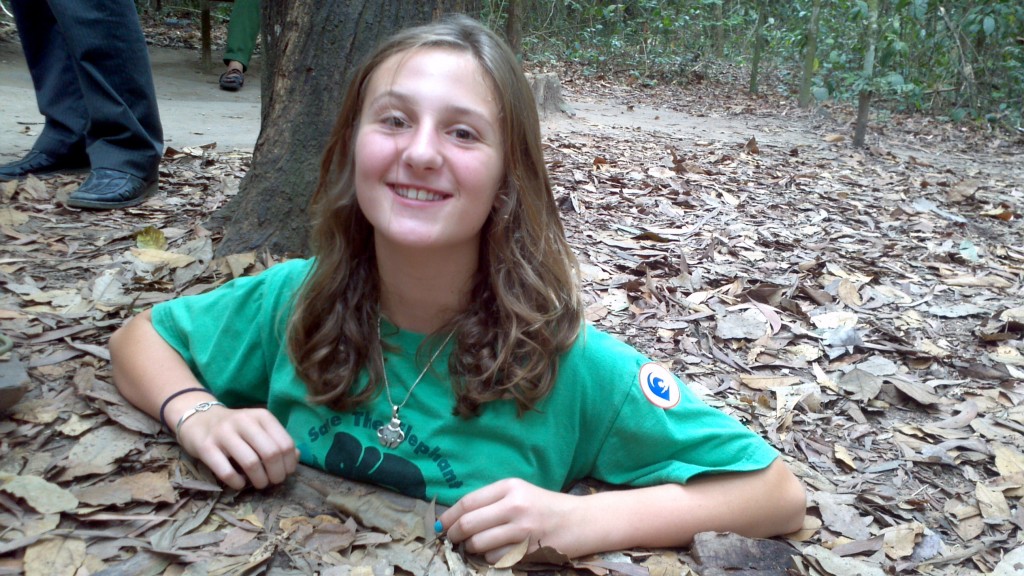
Hank experienced the razor one more time, this time in Bali. It was a medical necessity to shave the hair from his scalp before the doctor stitched the gash on his forehead.  A surfboard had hit him in the head, splitting his skin. Really, this was the most serious thing that happened to us on the whole trip. No car crashes despite the driving in India. No muggings despite the crime in Nairobi. No shootings despite the drug wars in Mexico. To tell you the truth, I don’t think it was because of good luck. I think that the dangers in travel are just not as common as we (including that guy I met in the salon before we left) perceive them to be. It may be more dangerous driving the freeways of California every day than spending a year traveling around the world. The third world isn’t the only dangerous place. We live in Oakland, one of the top 20 most dangerous cities in the US. We chose to face the danger of living in the world abroad rather than at home for a year. Granted, we did experience plenty of difficulties on our adventure. Luckily we only needed to wait a couple of weeks each time for things to get better. It just doesn’t take all that long for hair to grow back.
A surfboard had hit him in the head, splitting his skin. Really, this was the most serious thing that happened to us on the whole trip. No car crashes despite the driving in India. No muggings despite the crime in Nairobi. No shootings despite the drug wars in Mexico. To tell you the truth, I don’t think it was because of good luck. I think that the dangers in travel are just not as common as we (including that guy I met in the salon before we left) perceive them to be. It may be more dangerous driving the freeways of California every day than spending a year traveling around the world. The third world isn’t the only dangerous place. We live in Oakland, one of the top 20 most dangerous cities in the US. We chose to face the danger of living in the world abroad rather than at home for a year. Granted, we did experience plenty of difficulties on our adventure. Luckily we only needed to wait a couple of weeks each time for things to get better. It just doesn’t take all that long for hair to grow back.